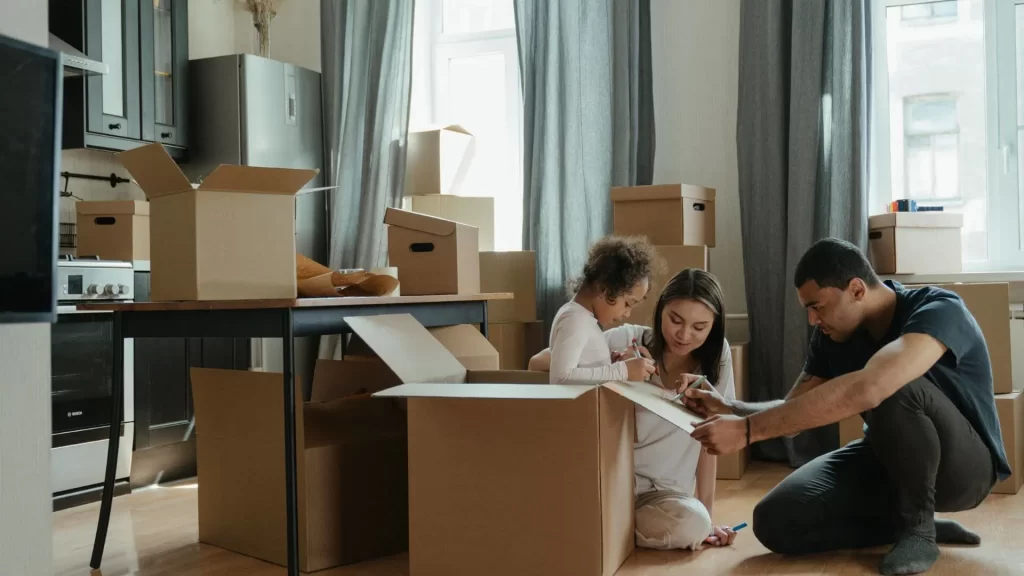Moving can be a daunting task, especially when it involves long distances. The thought of packing up your belongings, coordinating logistics, and settling into a new location can be overwhelming. However, with proper planning and organization, you can minimize stress and ensure a smooth transition. In this blog post, we will provide you with practical tips and strategies to help you stay organized and stress-free during a long-distance move.
Create a Detailed Moving Checklist
One of the first steps to staying organized is to create a comprehensive moving checklist. Start by listing all the tasks you need to accomplish before, during, and after the move. Break them down into smaller, manageable steps, and set realistic deadlines for each task. This will help you stay on track and avoid last-minute rushes. Some essential items to include in your checklist are:
- Researching moving companies or rental truck options
- Sorting and decluttering belongings
- Obtaining packing supplies
- Packing room by room
- Notifying utility companies and updating your address
- Arranging transportation for pets, if applicable
- Coordinating travel plans
Start Early and Prioritize
Long-distance moves require more time and effort compared to local moves. Begin the moving process as early as possible to allow yourself ample time to complete tasks without feeling overwhelmed. Start by tackling the least frequently used rooms or areas of your current home. This will give you a sense of progress and help you stay motivated. Additionally, prioritize tasks based on their urgency and importance, ensuring that critical items are taken care of first.
Sort and Declutter
Moving is the perfect opportunity to declutter and get rid of items you no longer need or want. Before you start packing, go through your belongings and sort them into three categories: keep, donate/sell, and discard. Sell or donate items that are in good condition but no longer serve a purpose for you. Discard items that are damaged or beyond repair. By reducing the number of items you need to pack and transport, you can save time, money, and energy.
Pack Systematically
Packing efficiently and systematically is crucial for a stress-free move. Start by gathering all the necessary packing supplies such as boxes, bubble wrap, packing paper, and tape. Clearly label each box with its contents and the room it belongs to. This will make unpacking much easier and prevent any confusion when you reach your new destination. Consider using color-coded labels or numbering system to further streamline the process. Pack fragile items with care, using appropriate padding and cushioning materials.
Create an Essential Box
Pack an essential box or suitcase containing items you will need immediately upon arrival at your new home. This box should include toiletries, a change of clothes, important documents, medications, chargers, and basic kitchen supplies. Having these essentials easily accessible will save you from digging through multiple boxes to find necessary items during the initial days after the move.
Take Advantage of Technology
Utilize technology to simplify the moving process. There are numerous apps and websites available that can assist you in various aspects of moving, such as inventory management, budgeting, and organizing your to-do list. Use digital tools to keep track of important documents, contracts, and receipts. Additionally, take advantage of online resources for change-of-address notifications and forwarding mail services.
Seek Help and Delegate
Moving is a significant undertaking, and it’s important to recognize when you need assistance. Don’t hesitate to ask friends or family members for help with packing, loading, or even emotional support during the process. If your budget allows, consider hiring professional movers who specialize in long-distance moves. Delegate tasks to reliable individuals to lighten your workload and reduce stress.
Take Care of Yourself
Amidst the chaos of moving, it’s crucial to prioritize self-care. Make sure you get enough sleep, eat nutritious meals, and engage in activities that help you relax. Take short breaks during the packing process to recharge. Engage in physical exercise or mindfulness practices to alleviate stress. Remember, a healthy mind and body will help you stay focused and energized during the move.

FAQs
How far in advance should I start planning for a long-distance move?
It is recommended to start planning for a long-distance move at least two to three months in advance. This will give you enough time to research moving companies, sort through your belongings, and make necessary arrangements for transportation and logistics.
How can I minimize the stress of packing and unpacking during a long-distance move?
To minimize the stress of packing and unpacking, start by decluttering and getting rid of unnecessary items before you begin packing. Use a systematic approach by packing one room at a time and clearly labeling each box with its contents and designated room. This will make unpacking more organized and efficient. Additionally, consider hiring professional packers who can handle the packing and unpacking process for you.
How can I stay organized while managing multiple tasks during a long-distance move?
Creating a detailed moving checklist is key to staying organized. Break down the tasks into smaller, manageable steps and set realistic deadlines. Prioritize tasks based on urgency and importance, and consider utilizing digital tools or apps to keep track of your to-do list. Delegate tasks to others when possible to lighten your workload and maintain organization.
What should I include in my essential box or suitcase?
Your essential box should contain items you will need immediately upon arriving at your new home. This may include toiletries, a change of clothes, important documents (such as identification, financial records, and medical records), medications, chargers, basic kitchen supplies (like utensils and a few non-perishable food items), and any other items necessary for your daily routine. Remember to keep this box easily accessible during the move.
How can I find reliable assistance during a long-distance move?
When seeking assistance during a long-distance move, start by asking friends and family members if they can help with packing, loading, or providing emotional support. If needed, consider hiring professional movers who specialize in long-distance moves. Be sure to do thorough research, read reviews, and obtain multiple quotes to find a reputable and reliable moving company.
Conclusion
Moving long distances can be an overwhelming experience, but by staying organized and following these practical tips, you can make the process smoother and less stressful. Creating a detailed moving checklist, starting early, decluttering, packing systematically, utilizing technology, seeking help, and taking care of yourself will ensure a successful and stress-free long-distance move. Embrace the adventure and look forward to the exciting new chapter ahead.
Also Read: Tips for a long-distance move


